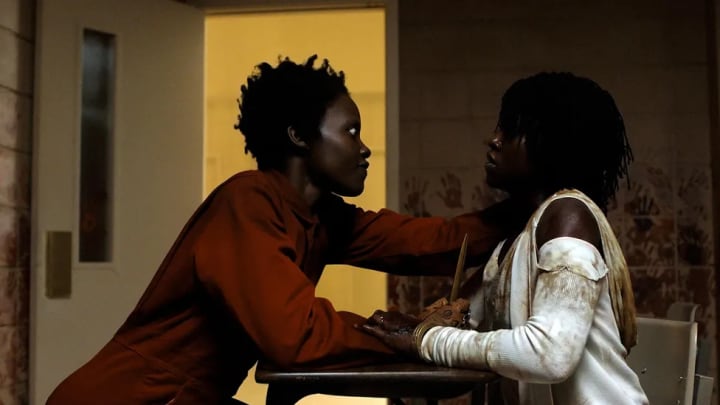
After another awards race both retrograde and predictable, one thing could truly make the 2020 Oscars one to remember: a best picture win for Parasite. According to the betting, Bong Joon-ho’s comedy-horror parable is second favourite to scoop the top prize this weekend after World War One drama 1917.
Should it clinch it, there are a number of reasons why it will be a remarkable choice. First of all, it will be a best picture winner that is, in fact, the best picture among the nominees – very far from a given, looking at the history of previous victors. Secondly, the South Korean film would be the first ever non-English-language production to claim the top award – a watershed moment that would be a symbolic step towards ending the perceived global dominance of US cinema.
Story continues below
And thirdly, subtitles aside, it would arguably be the most subversive best picture winner yet. Telling the story of a working-class family scamming their way into a rich household, it is a film that deals with the gap between the haves and the have nots in such trenchant terms, it would surely shame many attendees of the ceremony on Sunday evening – should they be endowed with self-awareness, at least.
Looking beyond Parasite itself, its victory would also seem to represent the distillation of a cultural moment, as identified by many commentators over the last few months – when mainstream cinema decided to raise its placards and confront the inequality and divisions at the heart of capitalist society. But before anyone gets too excited about any supposed ‘war on capitalism’ being enacted by an industry that is, arguably, ever more fixated, itself, on the bottom line, it’s worth sorting the genuinely penetrating works from the mere charlatans.
Joker’s shoddy allegory
In the latter camp certainly is one of Parasite’s key Oscar rivals: Joker, that box office colossus that also dominated critical discourse through the autumn – which is ironic, given it has so little, in fact, to say.
This origin story for the DC villain – presented as one Arthur Fleck, a mentally-ill clown turned murderous by his social marginalisation and economic disenfranchisement – clearly wants to be seen as some kind of political allegory. That much is clear from the way Fleck galvanises riots among Gotham’s disaffected citizens, sporting clown masks in tribute to him – and the overwritten monologue he delivers about the breakdown of the common good (“Nobody's civil anymore. Nobody thinks what it's like to be the other guy…”)
But for all the conversation there has been about it somehow reflecting our current moment, the film bears hardly more relation to political reality than the superhero product it so obviously wants to transcend. Not only does the decision to set it in the early 1980s keep any alleged social commentary at a safe distance, but it is so crashingly obviously an homage to films of the era – chiefly Martin Scorsese’s The King of Comedy – that its whole imagined world feels thoroughly synthetic.
And then there is the story’s lack of detail. The rampaging ‘have nots’ are patronisingly, incuriously characterised as an amorphous mob, while, by the same token, the ‘haves’ are shoddy cartoons. It may be a small thing, but, as some have wryly pointed out on social media, the fact that one of the loutish Wall Street bankers who is Fleck’s first victim is apparently au-fait with Stephen Sondheim, taunting Fleck as he does by singing Send in the Clowns, is an absurdity that shows up this film’s failure to create credible characters. Fleck’s nemesis, billionaire mayoral candidate Thomas Wayne, is a laughably injudicious politician, who whips up the economically-deprived section of the votership he has already branded “clowns” by declaring “they may not realise it, but I’m their only hope.”

This result is a simplistic ‘us v them’ narrative that fails in any way to reflect the complexity of today’s populist currents. Look at the US and UK, after all, and you can see that rich, privileged men are far from demonised: rather both have establishment leaders who have nevertheless successfully styled themselves as plain-speaking men of the people against a left-wing elite. To imagine a film where Thomas Wayne, not a marginalised, mentally-ill man, was the insurgent: now that would have been rather more pertinent.
Instead the film gets to hedge its bets with a cop-out ending, in which Fleck is held aloft by protestors while Gotham burns – a scene which, of course, may or may not be a figment of Fleck’s fevered imagination and so can justify its own pumped-up political and moral vacancy by relegating it to the realm of individual hallucination.
Knives Out’s ‘good immigrant’ fantasy
A film with a little more intelligence, but arguably not much more to say, is Knives Out – another awards-nominated (it’s up for a best original screenplay Oscar) autumn/winter hit that also serves up safe class-war fantasy. Rian Johnson’s transposition of the classic Agatha Christie whodunnit to the contemporary US is certainly entertaining, while its ensemble makes hay as the various overprivileged and underworked members of the Thrombey family, all suspects in the murder of their crime-writer paterfamilias Harlan.
And when it comes to social commentary, it has some mild fun with the impregnable self-delusion that can accompany privilege. There’s the way the various members of the leeching family like to see themselves as self-sufficient. And the manner in which they are at pains to characterise Harlan’s Latina nurse Marta as ‘family’ – an egalitarian charade, given how they exclude her from his funeral, and erupt in fury when they discover he has left her his fortune and home.
With its absurdly angelic heroine, Knives Out plays into the idea that immigrants are ‘deserving’ according to how morally spotless they are
However the problem with treating Knives Out as anything more than a throwaway romp is that the characterisation is so blunt as to make the satire unilluminating and somehow evasive. Whether it’s Toni Collette’s preternaturally vapid lifestyle influencer or Don Johnson’s xenophobic Trumpian, the Thrombeys are so transparently terrible from the get-go that, ironically given its genre, the film lacks any meaningful revelation. By the same token, the film’s working-class POC protagonist Marta is also absurdly angelic – to the extent that she is actually given a condition where she can’t lie without vomiting.

As good as actress Ana De Armas is at breathing life into the role, in Marta’s patronising characterisation the film plays dangerously into the very ‘good immigrant’ narrative that it also, at one point, takes a potshot at, in a scene in which Johnson's character uses Marta as an example of the 'right' sort of hard-working, law-abiding immigrant in his defence of Trump's policy of detaining migrant children in cages. That is, the narrative that says that immigrants are ‘deserving’, of rights, and of care and attention, according to how morally spotless they, or their families, are. How much more interesting it could have been with a more complicatedly human heroine.
By the end, we see Marta, having overturned the dastardly plot to frame her for Harlan’s murder, surveying her new estate from the balcony, while the chastened Thrombey clan stare up. To hammer home the film’s reversal-of-fortune plot, she is holding a mug emblazoned with the words ‘My house, my rules, my coffee’. It’s at once a cheering ending, and a self-congratulatory one – a piece of wish fulfilment that wraps the messy reality of a deeply divided country in a pretty bow.
A social mobility horror
Much more interesting than both Joker and Knives Out are two similarly mainstream Hollywood films that have, unlike them, not been nominated for Oscars – perhaps not surprisingly when you can consider that their takes on class and inequality are trickier and far less facile.
Jordan Peele’s horror Us, which came out last March, is, like his previous film Get Out, blessed with a brilliant high concept that nevertheless offers no neat answers. Its story of a middle-class American family threatened by another family of mute doppelgangers, who appear one night on the driveway of their holiday home, it is less about the divisions between rich and poor than their terrible correlation. In depicting an entire underground race of doubles, collectively dubbed “the Tethered”, the film expresses with simple metaphorical force the idea that success and affluence in a capitalist world is predicated on someone else’s failure and oppression.
The message from Jordan Peele is a stinging one: charity is pitiful compensation for systemic inequality
It’s a parable whose final twist is made more bracing by the essential likeability of its at-peril, obviously well-off protagonists – switched-on mum Adelaide (Lupita Nyong’o), big kid dad Gabe (Winston Duke) and their two children. It transpires that Adelaide is directly responsible for the oppression of her vengeful, seemingly-demonic lookalike ‘Red’ – and so too, therefore, for the mass uprising of the Tethered led by Red that plays out. As a child, we discover, Adelaide was originally one of the Tethered herself but escaped by seizing her overground counterpart and swapping places with them. It’s again a powerful metaphorical indictment of the whole great capitalist notion of ‘social mobility’, which encourages rampant individualism, and where for every person who ascends the class ladder, another must fall.
Peele’s piece de resistance, meanwhile, is having the Tethered stage their revolt holding hands in a riff on the 1980s ‘Hands Across America’ anti-poverty initiative. The message from both the Tethered, and Peele, is a stinging one: charity is pitiful compensation for systemic inequality. Here, unlike Joker, is a film which smuggles genuine anti-capitalist critique into a genre movie that has amazingly, if ironically, made $255 million (£191 million) to date.
Why Hustlers deserved more
Lorene Scafaria’s superb crime drama Hustlers is another deceptively slick but biting examination of the social food chain that should have been front and centre of the Oscars conversation – and not just for Jennifer Lopez’s star performance. In telling the true-life story, taken from a New York Magazine article, of a group of strippers who drugged and fleeced Wall Street bankers, it’s a female empowerment tale bleakly subverted.
As sex workers, and sex workers of colour, these women may belong to an especially marginalised demographic, but they don’t see themselves as victims of their privileged clientele: they’re more focused on playing the game than hating the players. And their skill at doing so is perfectly embodied by that scene: Jennifer Lopez’s gravity-defying entrance as gang leader Ramona, in which she pole dances to Fiona Apple’s Criminal amid a flurry of banknotes. “Doesn’t money make you horny?” Ramona says to her starry-eyed protege Destiny on leaving the stage – but it’s the desire for financial autonomy that makes them determined. “I don’t want to be dependent on anybody. Like ever,” says Destiny of her ultimate career goal.

However the limits of that independence are made brutally apparent when the 2008 banking crash enters the story. Its trickle-down effect both hits these women’s livelihoods and makes them more vulnerable to exploitation: the men want more for their money, and the cameras come out of the champagne rooms. That’s when they hatch their infamous scheme, which is framed as a reaction to a socio-economic system that invites crookedness. “This game is rigged and it does not reward people who play by the rules,” as Ramona puts it. The trouble with her statement being that while the game may not reward those who play by the rules, it only rewards some of those who break them. The law inevitably catches up with Ramona, Destiny et al; by contrast, to this day, only one top banker has ever gone to jail for their part in the 2008 credit crisis.
This game is rigged and it does not reward people who play by the rules – Ramona, Hustlers
The film impressively interrogates the very idea of packaging up stories like these for entertainment – and whether that in itself amounts to another form of capitalist exploitation. It does this via the framing device of Destiny recounting events to Elizabeth, a fictionalised version of Jessica Pressler, the journalist who wrote the New York Magazine story. Destiny is inherently suspicious of this white, Brown-educated woman and her privileged perspective.
There is a telling moment where Elizabeth declares, straining to show empathy: “I know I’m supposed to think that what you did was terrible, and that these guys didn’t deserve it. But to tell you the truth, I don’t feel sorry for them.” “Well, I feel sorry for them,” Destiny shoots back. The irony is that it is perhaps easier for us to take solace in simplistic class-war narratives (the kind of fantasy that Joker peddles, for example) when we have little or no experience of the reality of that war on the ground.
A story pertinent to Hollywood
Finally, there is nothing simplistic – nor consoling – about Parasite, whose twisted upstairs-downstairs story is as bleakly incisive as it is boldly imaginative. Like Hustlers, it is a study of people trying to game the capitalist system but having the limits of their agency brutally laid bare: in this case, a family of four working-class grifters, the Kims. Living in near-poverty in a dilapidated basement flat, they one-by-one inveigle their way into the services of a rich family, the Parks – as English tutor, art teacher, driver and housekeeper, respectively – by making up their credentials and, in two cases, getting people fired.
For the opening stretch, it’s a twisted black-comedy of con artistry, in which you can’t help but delight in our quartet’s scheming, even as it inflicts pain on those who least deserve it. But that dark comedy turns to abject horror with the blindsiding reveal, an hour in, of an underground bunker beneath the Parks’ minimalist modernist home. There, it transpires, the sacked housekeeper Moon-Gwang’s husband has been living in secret for years to avoid his debtors. Suddenly, the film reveals its true intent: here is not a satire on social climbing, but a parable of social degradation. As with Peele’s Us, it lays bare how the serenity of the well-off doesn’t just contrast with the chaos elsewhere, but is founded on it.
Parasite’s stinging study of the ‘nice’ and the damned could hardly have greater pertinence than when applied to Tinseltown
There are many remarkable elements to Bong Joon-ho’s unclassifiable work, from its cinematography to its plot turns; the sophistication of the characterisation is chief among them, however, notably when it comes to depicting the rich. Unlike in a number of the films mentioned above, the wealthy are not depicted as obviously terrible people from the outset. Mrs Park is a somewhat vacant but benign-seeming woman, and Mr Park a smoothly pleasant businessman.
But in fact, the film questions the whole ideas of ‘niceness’. When Mr Kim says of the Parks, “They're rich, but still nice,” his wife corrects them: “They're nice because they're rich.” And while it’s easier to be ‘nice’, if you have the means to be, being ‘nice’ can also be a way to shut down conflict, as evidenced by the toxically decorous way the Parks choose to dispose of staff at the first sign of fault, without fuss, or due process. Rather than confront their driver about his alleged misdeeds, Mr Park simply tells his wife to “find some excuse to let him go” and “give him a good severance package”. And the Parks expect a similar dissent-stifling propriety in return from their employees: “I like people who don’t cross the line,” Mr Park explains to Mr Kim.

However when Bong allows us a glimpse of the Parks together behind closed doors, in a seemingly private moment, we see their ‘true’ selves are much less decorous: Mr Park mocks Mr Kim’s smell, before the couple enact a grim ‘poverty porn’ sexual fantasy in which they imagine themselves as the hoi polloi, wearing cheap underwear and buying drugs.
This stinging study of the ‘nice’ and the damned could hardly have greater pertinence than when applied to Tinseltown. Here, after all, is a milieu containing within it the grossest privilege and abuses of power which nevertheless, at this time of year most of all, likes to parade its virtue.
Just as the Parks are unaware of the terrible reality literally beneath their feet, so Hollywood’s obliviousness can be mind-boggling – see, for example, Joaquin Phoenix’s recent need to remind his ecologically-vocal peers in his speech at the Golden Globes that “we don’t have to take private jets to Palm Springs.” Or indeed the widely-mocked tweet from Stella McCartney saluting Phoenix’s statement in – heaven forbid – choosing to wear the same tuxedo throughout awards season.
But more than mere obliviousness, of course, like the Parks, the film community also has a history of allowing injustice to thrive and avoiding ‘awkward’ conversations in order to maintain the status quo: think, of course, of the culture of silence that persisted around a man like Harvey Weinstein for so long. It’s far more reassuring of course to create anti-capitalist narratives with obvious bogeymen like Wall Street bankers and Trump-supporting blowhards; it’s more radical to suggest, as Parasite seems to, how affluence is an inherently corrupting state.
Eventually, the Kims do ‘cross the line’, in a bloodthirsty finale, which sees Mr Kim stab his employer in a moment of erupting class consciousness. But unlike in Joker, the film doesn’t fade out on some note of twisted triumph. Instead the coda brings everything not just crashing down to earth, but beneath the earth again. While a fugitive Mr Kim now occupies the bunker of his former employers’ villa, which has passed to new owners, his son, barely seeing sunlight in his family’s own grimly subterranean apartment, forlornly fantasises about buying the house and his father’s freedom. Forget heroes or anti-heroes: in Bong’s uncompromising vision, the insurmountable social hierarchy is the final victor.
In a director’s statement, Bong has described Parasite as a “comedy without clowns, a tragedy without villains”. Let’s hope the clownless triumphs over the clown – and everyone else – come Sunday night.
About the Creator
Monu Ella
And I know it's long gone and there was nothing else I could do






Comments
There are no comments for this story
Be the first to respond and start the conversation.